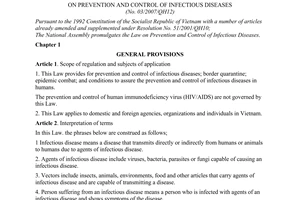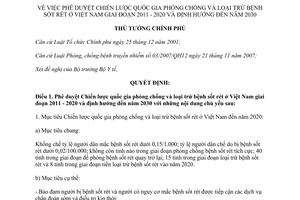Nội dung toàn văn Decision No. 1920/QD-TTg approving the national strategy for malaria prevention
|
THE
PRIME MINISTER |
SOCIALIST
REPUBLIC OF VIET NAM |
|
No. 1920/QD-TTg |
Hanoi, October 27, 2011 |
DECISION
APPROVING THE NATIONAL STRATEGY FOR MALARIA PREVENTION, CONTROL AND ERADICATION IN VIETNAM IN THE 2011-2020 PERIOD, WITH ORIENTATIONS TOWARD 2030
THE PRIME MINISTER
Pursuant to the December 25, 2001 Law on Organization of the Government;
Pursuant to November 21, 2007 Law No. 03/2007/QH12 on Prevention and Control of Infectious Diseases;
At the proposal of the Minister of Health,
DECIDES:
Article 1. To approve the national strategy for malaria prevention, control and eradication in Vietnam in the 2011-2020 period, with orientations toward 2030, with the following principal contents:
1. Objectives of the national strategy for malaria prevention, control and eradication in Vietnam in the 2011-2020 period, with orientations toward 2030:
a/ General objectives:
To keep the malaria morbidity rate below 0.15 per thousand and the malaria mortality rate below 0.02 per hundred thousand; there will be no province in the stage of active malaria prevention and control, 40 provinces in the stage of prevention of malaria recurrence, 15 provinces in the stage of malaria eradication and 8 provinces in the stage of malaria pre-eradication by 2020.
b/ Specific objectives:
- To ensure malaria patients and people at risk of contracting malaria have access to early diagnosis and timely treatment services;
- To ensure malaria prevention and control measures be implemented in an effective and appropriate manner for inhabitants in malaria-prone areas;
- To eradicate malaria in provinces with low malaria incidence and reduce malaria morbidity rates in provinces with high or moderate malaria incidence;
- To enhance capacity of the malaria surveillance network to be able to prevent and control malaria outbreaks;
- To step up scientific research and application of scientific research findings to malaria prevention, control and eradication;
- To raise the people's awareness about malaria prevention and control so that they will proactively participate in preventing and controlling malaria with highest effectiveness.
2. Major measures:
a/ Policy and social measures:
- To regard malaria prevention, control and eradication as a socio-economic development target of sectors and localities. To increase communication and education measures to raise public awareness about proactive participation in malaria prevention, control and eradication;
- To further study and improve regimes and policies concerning malaria prevention, control and eradication to meet practical requirements and in line with the international integration trend;
- To promote health communication and education to raise the awareness and change behaviors of people, particularly of inhabitants in areas at high risk of contracting malaria, about anti-malaria measures. To form a contingent of communicators on malaria prevention, control and eradication in village health collaborators and officers and cadres of commune-level state agencies and mass organizations.
b/ Professional and technical measures:
- To increase measures for early detection and timely treatment of malaria according to set guidelines, attaching importance to developing and maintaining effective activities at microscope points in communes and inter- communes, particularly in areas with malarial parasites resistant to Artemisinin and derivatives and areas at high risk of transmission of these parasites;
- To update information on malaria diagnosis and treatment according to the World Health Organization guidelines and practical malaria treatment in Vietnam;
- To assure sufficient supply and proper management of anti-malaria drugs of high effect, combined drugs with Artemisinin derivatives and other anti-malaria drugs for different levels;
- To supply free of charge mosquito nets soaked with lasting mosquito repellents for inhabitants in areas with high or moderate
malaria incidence, including free migrants, cross-border travellers, and poor households in areas with low malaria incidence; to mobilize people to buy mosquito nets and form the habit of sleeping in mosquito nets;
- To zone malaria epidemiological areas; to increase surveillance of the density, distribution and repellent resistance of malaria mosquitoes; to inform and apply measures to prevent and control malaria mosquitoes; to integrate these measures with those against mosquitoes transmitting other diseases;
- To develop and strengthen the monitoring and evaluation systems of anti-malaria programs from the central to local level. To develop the process for and guide the monitoring and evaluation of anti-malaria programs for each level. To evaluate effectiveness of the epidemiological zoning program for intervention in malaria prevention, control and eradication in an annual and five-year basis.
c/ Measures of scientific research and application of scientific research findings to malaria prevention, control and eradication:
- To prioritize researches in anti-malaria drugs, malaria treatment guidelines and measures of using chemical repellents against malaria mosquitoes in an appropriate and effective manner;
- To promote the transfer and exchange of techniques and specialist training among domestic and foreign anti-malaria research institutes.
d/ Measures regarding resources and international cooperation:
- To strengthen the network of and build capacity for staff in charge of malaria prevention, control and eradication;
- To incrementally increase investments in and assure funds for malaria prevention, control and eradication, including central budget funds and other donated funds. To allocate and use resources in an effective manner;
- To expand international cooperation on malaria prevention, control and eradication, strengthening existing cooperative relations while seeking new opportunities of cooperation in the direction of multilateralization and diversification of relations. To prioritize projects of cooperation on financing, technical assistance and transfer of modern technologies.
3. Orientations for the national strategy for malaria prevention, control and eradication in Vietnam by 2030
a/ Striving to eradicate malaria nationwide:
- To continue the effective implementation of malaria prevention, control and eradication programs;
- To increase the management and direction of malaria prevention, control and eradication to realize national and international commitments, step up and maintain interdisciplinary coordination in malaria prevention, control and eradication;
- To ensure funds for investment in malaria prevention, control and eradication activities in malaria-affected provinces.
b/ Monitoring, supervising and evaluating the progress of malaria eradication on an annual and five-year basis.
Article 2. Action programs of the national strategy for malaria prevention, control and eradication
1. Continued implementation of the approved national program on malaria prevention, control and eradication.
2. The action program on increased early detection and diagnosis and timely treatment.
3. The action program on prevention and control of malaria mosquitoes and personal protection.
4. The action program on health communication and education about malaria prevention, control and eradication.
5. The action program on zoning malaria epidemiological areas for intervention and evaluation of the effectiveness of the malaria prevention, control and eradication program.
6. The action program on prevention and control of the transmission of malarial parasites resistant to Artemisinin and its derivatives.
7. The program on scientific research in malaria prevention, control and eradication.
Article 3. Organization of implementation
1. The Ministry of Health shall direct provincial-level Health Departments and anti-malaria agencies to advise chairpersons of People's Committees at all levels on the performance of specific tasks defined in the strategy; and supervise and monitor the implementation, preliminary reviews and final review and report performance results to the Ministry of Health for summarization and reporting to the Prime Minister.
2. The People's Committees of provinces and centrally run cities shall direct the implementation of the contents and action programs of the strategy in their localities; elaborate and identify the objectives of malaria prevention, control and eradication in local socio-economic development plans; arrange budgets for anti-malaria programs and attach importance to increasing human resources and improving physical foundations for anti-malaria units. For localities with high or moderate malaria incidence, provincial-level People's Committees shall concentrate on directing the implementation of strong-intervention measures to reduce morbidity and mortality rates and prevent the occurrence of malaria outbreaks. For localities with low malaria incidence, provincial-level People's Committees shall concentrate on directing the implementation of intervention measures and the effective implementation of the stages one after another of the malaria eradication program.
3. The Ministry of Information and Communications shall coordinate with the Ministry of Health in directing information and communications agencies at all levels to step up information, communication and education about methods of malaria prevention, control and eradication, especially in malaria-affected localities and among target groups at high risk of contracting malaria, and take the initiative in allocating funds for the development of anti-malaria communication program.
4. The Ministry of Education and Training shall assume the prime responsibility for, and coordinate with the Ministry of Health and related agencies in, stepping up communication and education to raise awareness and change behaviors of teachers, students and pupils related to malaria prevention, control and eradication.
5. The Committee for Ethnic Minority Affairs shall further direct its subordinate agencies to coordinate with same-level health agencies in charge of malaria prevention and control in implementing the contents and action programs of the strategy.
6. The Ministry of Labor, War Invalids and Social Affairs shall coordinate with the Ministry of Health and related ministries and sectors in studying and working out regimes and policies for cadres, public employees and workers engaged in malaria prevention, control and eradication.
7. The Ministry of Planning and Investment and the Ministry of Finance shall arrange and allocate funds in a timely manner for the implementation of national malaria prevention and control programs according to National Assembly-approved national budget plans.
8. The Ministry of National Defense and the Ministry of Public Security shall take the initiative in implementing the strategy among the armed forces, taking into account the characteristics of their ministries, and in allocating budgets for this work; and join the people in the prevention, control and eradication of malaria in localities where their units are based.
9. The Ministries of Construction; Industry and Trade; Transport; and Agriculture and Rural Development shall coordinate with the Ministry of Health in implementing the strategy for their cadres, public employees and workers in malaria-affected areas and take the initiative in allocating budgets for this work.
Article 4. Funds for the strategy implementation
1. Funding sources
Funds from the state budget, government bond proceeds, loans and other lawful sources shall be mobilized and efficiently used.
2. Funds
Funds for the implementation of the strategy will total around VND 1,673 billion.
The Ministry of Planning and Investment and the Ministry of Finance shall allocate funding sources for the implementation according to the budget law.
The Ministry of Health and provincial-level People's Committees shall take the initiative in allocating sectoral and local budgets for investment in the prevention, control and eradication of malaria according to their annual tasks and projects.
Article 5. Effect
This Decision takes effect on the date of its signing.
Article 6. Implementation responsibility
Ministers, heads of ministerial-level agencies, heads of government-attached agencies and chairpersons of provincial-level People's Committees shall implement this Decision.-
|
|
FOR
THE PRIME MINISTER |


